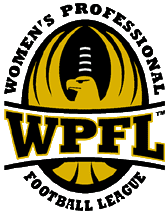

|
|
|
||
| Line 58: | Line 58: | ||
| align="center" | SoCal Scorpions || align="center" | 6-4 || align="center" | Houston Energy |
| align="center" | SoCal Scorpions || align="center" | 6-4 || align="center" | Houston Energy |
||
|} |
|} |
||
==References== |
|||
{{reflist}} |
|||
==External links== |
==External links== |
||

The WPFL logo
| |
| Sport | American football |
|---|---|
| Founded | 1999 |
| No. of teams | 1 |
| Country | |
| Most recent champion(s) | So Cal Scorpions |
The Women's Professional Football League (WPFL) was the first and longest operating women's professional American football league in the United States. With teams across the United States, the WPFL had its first game in 1999 with just two original teams: the Lake Michigan Minx and the Minnesota Vixens. Fifteen teams nationwide competed for the championship in 2006.
The league had been recognized in national media campaigns, in the book Atta Girl, and even had a team (the New England Storm) that had a commercial relationship with an NFL team, the New England Patriots.
Unlike the other women's American football franchises, the WPFL operated as a fall league and not a spring league.
In the early 1960s, many women thought that sports in the US were sexist and needed to shift in another direction, moving beyond the stereotype that women were passive. This sentiment formed the background for the women's football league that was started in order to prove that women had the power to do what men did, with hopes that people would enjoy women's football as much as they did men's. In 1965, the name changed to its WPFL incarnation. Since there were no college women's football teams in the US, most of their athletes came from basketball, rugby, and association football (soccer). After a few years, the sport began to fade.
In 1997 two businessmen, Carter Turner and Terry Sullivan,[1] decided to research the feasibility of a professional women’s football league by gathering together top female athletes into two teams and playing an exhibition game in front of an audience. The game between the Lake Michigan Minx and the Minnesota Vixens at the Hubert H. Humphrey Metrodome in Minneapolis, Minnesota was a success and turned into a six-game exhibition tour across the country[2] dubbed the “No Limits” Barnstorming Tour. The first season was actually played in 1998 but the New England Storm who finished 0-6 claimed that the games were officiated unfairly and filed a grievance against the league. The Storm won the grievance and had the 1998 season vacated and had the league hire new officials.[3]
The success of the Barnstorming Tour led to the first official WPFL season in 2000 with 11 teams competing nationwide.[4] This first season ended with some turmoil however; the regular season was shortened by several games, players were not given their promised $1,000,000 per-game salaries, and there were allegations regarding instability with some of the league's financial backers. It was also claimed that multiple games were scripted to help the new England Storm make the championship. This was proven by a number of penalties and bad calls and the Storm finished the season strong (6-0) but lost the championship to the Florida Stingrays 69-7.[5]
The WPFL rebounded the next year completing the 2001 season after several organizational changes. Notable changes included the departure of founders Sullivan and Turner (Turner then founded the WAFL;[6] restructure of the league by several WPFL team owners: Melissa Korpacz - New England Storm, Robin Howington - Houston Energy, and Donna Roebuck and Dee Kennamer - Austin Rage;[7] changes to player/team compensation; and the moving of the start of the season from fall to summer.[8]
| Year | Champion | Score | Runner-Up | ||||
|---|---|---|---|---|---|---|---|
| 1998 | New England Storm | n/a | n/a | 1999 | Lake Michigan Minx | 130-7 | Minnesota Vixen |
| 2000 | Florida Stingrays | 69-7 | New England Storm | ||||
| 2001 | Houston Energy | 47-14 | Austin Rage | ||||
| 2002 | Houston Energy | 156-7 | Wisconsin Riveters | ||||
| 2003 | Northern Ice | 53-4 | New England Storm | ||||
| 2004 | Dallas Diamonds | 68-0 | Northern Ice | ||||
| 2005 | Dallas Diamonds | 61-8 | New York Dazzles | ||||
| 2006 | Florida Stingrays | 73-1 | Houston Energy | ||||
| 2007 | SoCal Scorpions | 6-4 | Houston Energy |
|
Women's gridiron football leagues
| |
|---|---|
| United States |
|
| Canada |
|
| Australia |
|
| Defunct |
|